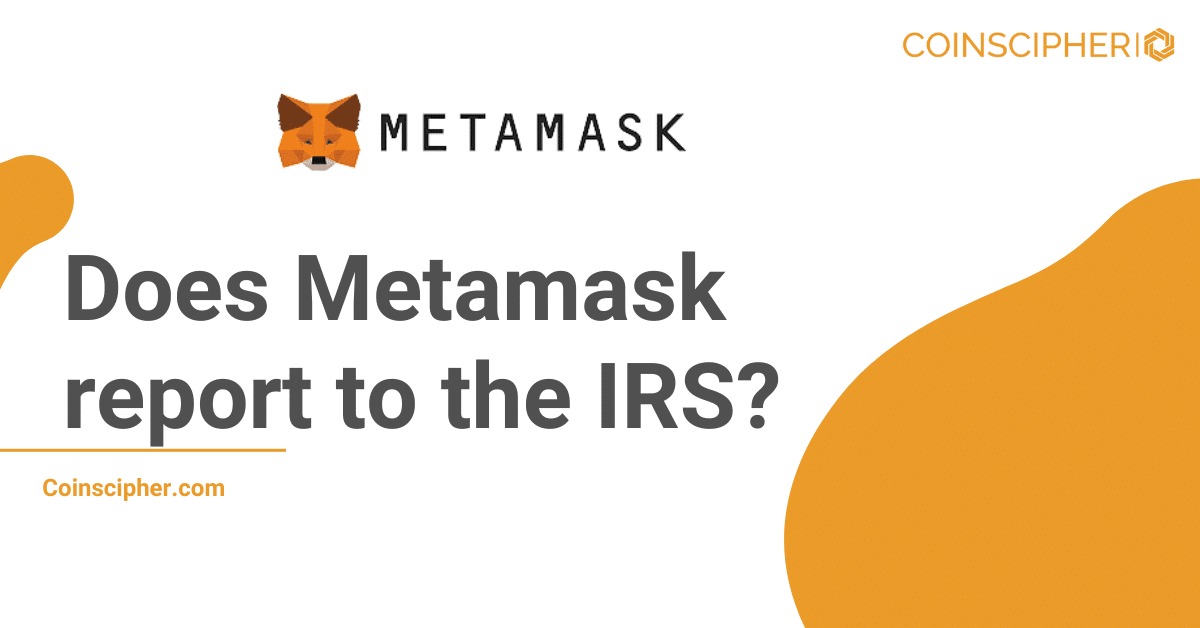Let’s explore the question: Does Metamask report to the IRS? Our investigation will delve into the connection between Metamask and tax reporting, highlighting its non-custodial nature and the lack of personal data collection. Furthermore, we will discuss the correct method of filing taxes concerning cryptocurrencies, focusing specifically on Metamask, and emphasizing the significance of precise reporting. We will also provide a recommended approach for effectively managing your crypto transactions to ensure compliance with tax regulations.
Does Metamask Report Your Activity To The IRS?
Metamask is a non-custodial wallet and therefore does not require any personal details during its creation, and is not legally obligated to report user activity to the Internal Revenue Service (IRS). Unlike centralized exchanges that collect personal information through KYC, non-custodial wallets like Metamask allow users to trade cryptocurrencies anonymously.
However, even though Metamask itself doesn’t report to the IRS, users are still required to comply with tax regulations and report their cryptocurrency transactions accurately to avoid penalties and legal consequences.
Read More: How to Transfer From Crypto.com to DeFi Wallets
Does The IRS Track Metamask?
As of now, the IRS does not specifically track Metamask or any other individual crypto wallet. Moreover, the characteristic of a non-custodial wallet, allows users to create wallets and engage in crypto transactions without revealing their personal information, making it challenging for the IRS to monitor specific wallet users.
However, it’s important to note that while the IRS may not track individual wallets like Metamask directly, the agency possesses mechanisms to gather information on cryptocurrency transactions from various sources, ensuring tax compliance within the virtual currency space.

IRS’s Approach to Crypto Tax Compliance:
- Data Analysis and Blockchain Analytics: The IRS collaborates with specialized blockchain analytics companies to track and analyze cryptocurrency transactions on public blockchains. These analytics tools can identify wallet addresses associated with taxable events, helping the IRS trace individuals’ crypto activities, including those conducted through Metamask.
- Information Requests to Exchanges: While Metamask itself doesn’t report transactions, some users might transfer funds between their Metamask wallets and centralized exchanges. The IRS has the authority to request transaction data from these exchanges to cross-reference and verify taxpayers’ crypto-related activities.
- Tax Filings and Audits: The IRS relies on taxpayers to report their cryptocurrency transactions accurately in their tax filings. During audits, the agency may request additional information and documentation to verify the reported crypto activities, including transactions performed through Metamask.
- Policy Changes and Compliance Efforts: With the continuously evolving crypto landscape, regulations surrounding cryptocurrency taxation are subject to change. The IRS may introduce new guidelines and requirements, potentially impacting how non-custodial wallets like Metamask handle tax reporting in the future.
Metamask Overview
MetaMask, a widely adopted and renowned cryptocurrency wallet and browser extension, facilitates effortless interactions with decentralized applications (dApps) on the Ethereum blockchain. Serving as a crucial bridge between web browsers and the Ethereum network, MetaMask guarantees the secure administration of Ethereum-based assets, seamless access to dApps, and the execution of smart contracts. Its user-friendly interface, adept private key management, and compatibility with diverse Ethereum networks, make MetaMask a reliable and favored choice among individuals and developers venturing into the realms of decentralized finance (DeFi) and blockchain applications.
Read More: Bridging MetaMask with Paypal
Do Crypto Transactions Have To Be Reported To The IRS?
Yes, crypto transactions have to be reported to the IRS in the United States. Cryptocurrency is treated as property by the IRS and general tax principles applicable to property transactions apply to virtual currency transactions. This means that capital gains and losses from cryptocurrency transactions need to be reported on your tax return, just like any other property transaction. Failure to report taxable crypto transactions can result in penalties and fines.
Various transactions on Metamask can trigger taxable events. These events include selling cryptocurrency for fiat currency, trading one cryptocurrency for another on decentralized exchanges (DEXes), using cryptocurrency to purchase goods or services, receiving crypto from a fork, or earning through mining.
However, not every transaction on Metamask is taxable. Some events such as buying cryptocurrency with fiat currency (e.g., using a credit/debit card), donating crypto to tax-exempt organizations, gifting cryptocurrency, or transferring crypto between your own wallets, are generally not taxable.
MetaMask Gas Fees Tax
Gas fees are an essential aspect of using the Ethereum network, including when performing transactions with your MetaMask wallet. Understanding how these fees are taxed can be beneficial for accurate reporting. Here’s what you need to know:
Tax Implications of Gas Fees
The tax treatment of gas fees can vary depending on the purpose of the transaction:
Gas Fees for Asset Acquisition
When you use MetaMask to buy or acquire cryptocurrencies, the gas fees incurred in the process can be considered as part of the cost basis. Adding gas fees to the cost basis can help reduce the overall capital gain when you dispose of the assets, potentially lowering your tax liability.
Gas Fees for Asset Disposal
The same goes for gas fees that are associated in asset disposal. Gas fees associated with selling or disposing of cryptocurrencies are generally considered a reduction in gross proceeds. Including these fees in the transaction’s cost can lead to a lower capital gain, consequently reducing the tax you owe on the gains.
Read More: Does Binance Report to The IRS?
How Can I File Metamask Taxes?
Filing taxes on your crypto transactions through MetaMask requires careful record-keeping and an understanding of tax regulations. Follow these steps to file your Metamask taxes accurately:
- Keep Detailed Records of Your Transactions
- Use Crypto Tax Software like Cointracker
- Identify Taxable Events on Metamask
- Report Gains and Losses Accurately
Step 1: Keep Detailed Records of Your Transactions
To successfully file your Metamask taxes, it’s essential to maintain comprehensive records of all your cryptocurrency transactions carried out using the wallet. Make note of the date, amount, and purpose of each transaction, whether it’s buying, selling, trading, receiving, or sending cryptocurrencies.
Step 2: Use Crypto Tax Software like Cointracker
Opt for crypto tax software like Cointracker which simplifies the tax filing process. These platforms allow you to link your Metamask ETH wallet address and automatically generate tax forms for your taxable transactions. By using such tools, you can save time and effort in preparing your tax reports.
Step 3: Identify Taxable Events on Metamask
Understand which events on your Metamask wallet are taxable. Some taxable events include selling cryptocurrency, trading one cryptocurrency for another on decentralized exchanges (DEXes), using crypto to purchase goods or services, receiving crypto from a fork, or engaging in mining activities.
Step 4: Report Gains and Losses Accurately
Ensure that you accurately report all gains and losses resulting from your crypto transactions on Metamask in your tax returns. Differentiate between short-term and long-term capital gains as they may have varying tax rates. Additionally, report any income earned from staking rewards, airdrops, or other crypto-related activities.
How Do I Get My MetaMask Tax Documents?
To obtain your MetaMask tax documents and ensure accurate reporting of your crypto transactions, follow these steps:
- Access Your MetaMask Wallet
- View Account on Etherscan
- Download CSV Import
- Specify Date Range
- Download the CSV File
Step 1: Access Your MetaMask Wallet
Access your MetaMask wallet on your desktop or mobile device. Ensure that you are logged in to the correct account, and not share your login details with anyone.
Step 2: View Account on Etherscan
Click on the three dots located in the top-right corner of your MetaMask extension. From the dropdown menu, select the option to “View Account on Etherscan.”
Step 3: Download CSV Import
On the Etherscan page displaying your MetaMask transactions, look for an option to download a CSV import of your transactions. Click on this option to proceed.
Step 4: Specify Date Range
When prompted, specify the date range for the transactions you want to include in your tax documents. Choose the appropriate time period relevant to your tax reporting.
Step 5: Download the CSV File
Complete any necessary verification, such as reCAPTCHA, and proceed to download the CSV file containing all your relevant MetaMask transactions within the specified date range.
Do I Have to Pay Taxes on My MetaMask Transactions?
When it comes to MetaMask transactions, tax obligations may arise depending on the nature of the transaction. Here’s a breakdown of potential tax implications:
Capital Gains Tax
If you engage in transactions with your MetaMask wallet that result in a gain, such as selling, swapping, or spending cryptocurrencies, you may be subject to Capital Gains Tax. This tax applies to any profits you make from the increase in the value of your crypto assets.
Income Tax
In certain cases, you may earn new coins or tokens through activities like airdrops or staking rewards while using MetaMask. Such earnings are typically viewed as additional income and may be subject to Income Tax upon receipt.
Wrapping Up
It’s important to note that crypto transactions on MetaMask and other platforms need to be reported to the IRS in the United States. Understanding the tax implications of different transactions and reporting gains and losses diligently ensures compliance with tax regulations and a smooth filing process. As the crypto landscape evolves, staying informed about policy changes and using reliable tools for tax reporting is crucial for crypto enthusiasts and investors to navigate the changing taxation landscape effectively.




